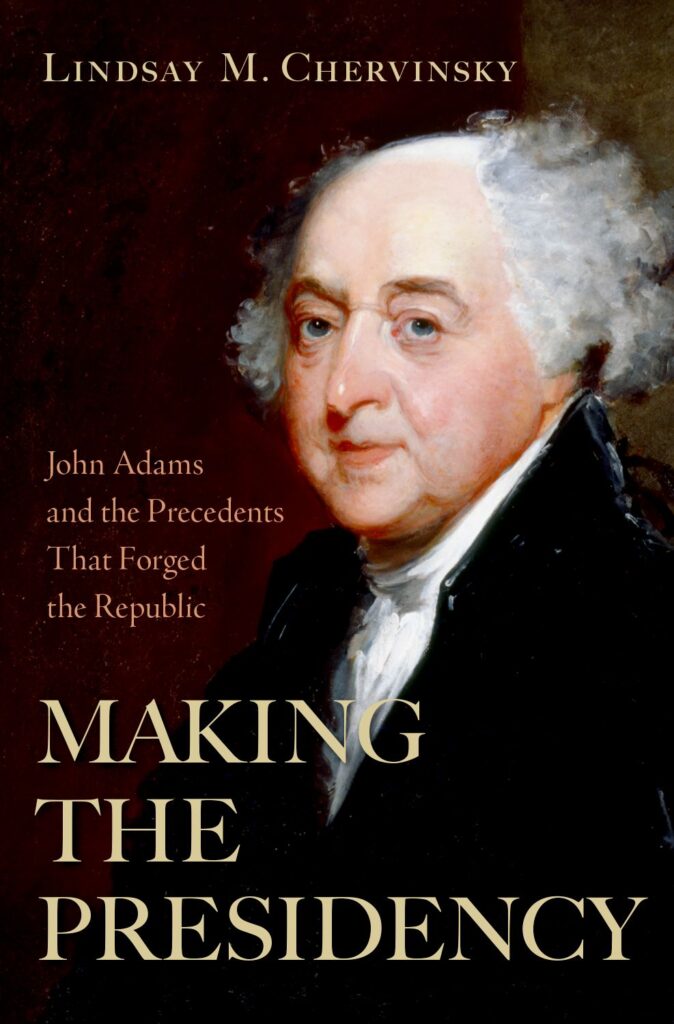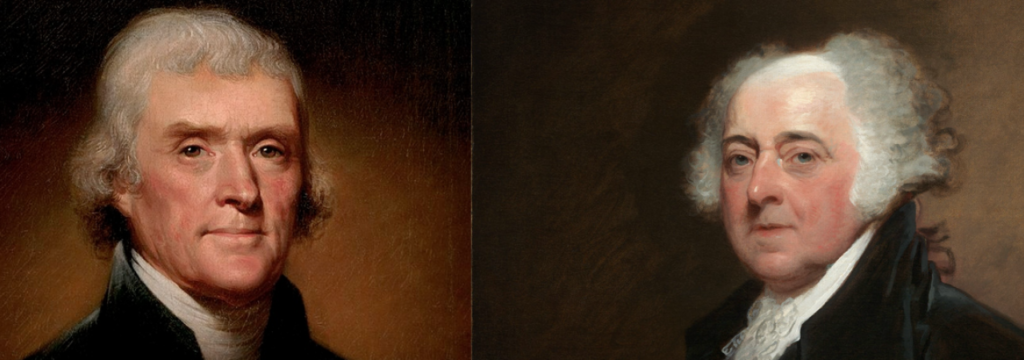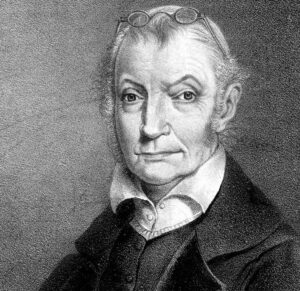Lindsay Chervinsky’s new book closely examines the dramatic events that shaped America’s pattern for the peaceful transfer of power.

All the historians and political thinkers agree. When the peaceful transfer of power breaks down, a republic or a democracy is in danger of collapse. We all remember the good old days when a presidential election was decided on the night of the vote, and the loser found a way to congratulate his opponent and offer to cooperate wherever possible. We 21st century Americans thought our extraordinary civic heritage and our devotion to the norms that make politics possible were so deeply rooted in our national life that nobody would ever refuse to accept the results of a fair election.
My friend Lindsay Chervinsky’s new book, Making the Presidency: John Adams and the Precedents that Forged the Republic, gives great attention to the importance of peaceful transfer of power. Here’s the story from that perspective.
George Washington was our only unanimous president. He tried to retire after a single term and insisted on it after his second term.
Now what? Nobody could equal the nation’s savior and greatest hero, “first in war, first in peace, first in the hearts of his countrymen.” However, someone had to be the second president; for most people in the country, that meant his vice president, John Adams. Adams was not Washington, of course, but he was one of the most significant figures in the American Revolution, the author of the Constitution of Massachusetts, semi-co-writer of the Declaration of Independence, a seasoned diplomat, and the author of several interminable volumes on the science of government.
There was a spirited election in 1796, but John Adams won handily. One of the most striking revelations in Ms. Chervinsky’s book is that President Washington never once invited his vice president, John Adams, to a cabinet meeting. He made no attempt to keep Adams informed of domestic policy or international affairs. Washington was — as a man of the 18th century and the Enlightenment — studiously gracious towards Adams, but he did not do anything to brief his successor — or even explain such things as the working protocols of the cabinet. Fortunately, Adams’ policies were nearly identical to those of his predecessor.
Then, Thomas Jefferson defeated Adams after just a single term. The election of 1800 marks the first time national government power was transferred from one party of men to another under our Constitution. It’s true that the emerging political parties — Jefferson’s Republicans and Hamilton’s Federalists — were still coming into being in 1800, but it was clear to the whole country that Jefferson represented a significant break with the Federalist era (1788-1800). He tilted towards France, not England. He was an agrarian visionary straight out of Homer and Vergil at a time when America’s economy was becoming overtly capitalist and would soon embrace the industrial revolution. Jefferson’s enemies regarded him as a French-tainted radical demagogue and atheist. He had made stern statements about the ruinousness and illegitimacy of a national debt that led his enemies to believe he might repudiate the debt if he ever got his hands on the levers of power. He was a slaveholder.
Adams was bitter about the election, but he cooperated in the transition. He wrote Jefferson a careful letter of congratulation and offered him horses and a carriage that he’d purchased but now regarded as U.S. government property. They had tea and dinner. And yet Adams did not attend Jefferson’s inauguration on March 4, 1801. He left town at 4 a.m. on the dawn stage to Baltimore.

Here’s where my friend Lindsay and I disagree. She argues that we didn’t really have a norm about attending your successor’s inauguration back then, that the Constitution is silent about this matter, that Adams may honestly have felt he wasn’t welcome at the ceremony, that he had not formally or informally been invited by president-elect Jefferson, his old friend, to participate in the transfer of power. Etc.
And yet.
Washington had come to Adams’ inauguration on March 4, 1797. Creator of precedents that he was, Washington could have made the case that attending Adams’ inauguration would be unfair to Adams. It was his turn now, and Washington’s presence might draw attention away from the new executive.
I believe that Adams erred twice in skipping out of town on the dawn stage. First, it was ungentlemanly towards Jefferson, whom he had worked with and loved for a quarter century of revolution and diplomacy. They were two of the small “band of brothers” that brought on the birth of the Declaration of Independence in 1776. What Adams did on March 4, 1801, was a snub born of bitterness, depression, and humiliation, coupled with a fierce desire to get home to Quincy, his farm, and Abigail.
Skulking out of town was an even graver betrayal of the Idea of a Republic. By shaking Jefferson’s hand and listening to his inaugural address, Adams would have signified that he respected his successor and wanted to assure the public by his presence that America was in responsible hands. He would have signified that peaceful transfer of power was one of the most essential things in a republic, and every ounce of public ritual that made these transitions harmonious was crucial to government continuity, the sensibilities of the American people, and the ideals of the American experiment.
Adams knew better. What he did is perfectly understandable, especially when you factor in that he was actively grieving for the death of his son Charles (November 30, 1800) by way of acute alcoholism. However, it was a rare lapse of political responsibility by John Adams.
Nevertheless, the transfer of power in 1801 was smooth. Even John Marshall, Jefferson’s distant cousin who detested the new president, reported that Jefferson’s inaugural address was conciliatory and blameless. Washington socialite (if that term is not reductive) Margaret Byard Smith was so impressed by the peaceful transfer that she wrote one of the most famous passages in the annals of American political history:
“The changes of administration, which in every government and in every age have most generally been epochs of confusion, villainy and bloodshed, in this our happy country take place without any species of distraction, or disorder.”
A Quirk of the Electoral College

The drama of the transfer of power in 1800 had little to do with Adams and everything to do with Aaron Burr and the Federalists. Jefferson and his running mate Aaron Burr had each received 73 electoral votes in the election (Adams 65). Thus Jefferson and Burr tied, and even though everyone in the country knew that Jefferson was president, Burr vice president, the Constitution could only see a tie; and when that happened, said Article II of the Constitution, the president would be immediately chosen by the House of Representatives, where on this occasion each state had only one vote.
Note: Under the original terms of the Constitution, the person who got the most electoral votes was the president or the runner-up vice president, irrespective of their party affiliations or political outlooks. After the crisis of 1800, the Constitution was amended to separate the vote for president and vice president. The 12th Amendment was ratified on June 15, 1804.
To this day, no historian knows quite what Burr was thinking in the first weeks of 1801, what his hopes were, and just how he maneuvered behind the scenes, but the consensus is that he eventually decided (on the one hand) that he would not lobby to displace Jefferson but (on the other hand) he wouldn’t turn down the opportunity to be president if that’s what the House of Representatives decided. Jefferson wanted Burr to renounce the Federalist strategy and make it clear that he would refuse the presidency if offered to him in this unscrupulous way. Burr held his cards close to his chest. Jefferson never forgave Burr’s coyness.
When the House of Representatives met to certify the election (sound familiar?) on February 11, 1801, eight states were planning to vote for Jefferson, six for Burr, with two states not voting.
“Anyone who says our time’s partisanship and political chicanery are unprecedented has not studied much American history.”
Clay Jenkinson
The new national capital barely had enough infrastructure and amenities to house members of Congress, the Supreme Court, and the president’s cabinet — and now thousands, probably tens of thousands, of citizens flocked to the District of Columbia to promote their interests. There was a report of 50 men sleeping in blankets on the floor of one of the district’s few hotels. Most of these citizens who flooded Washington were Jeffersonians, and they were in a terrible mood.
One historian of this crisis writes: “The lobby of the House had to be cleared of a noisy, angry crowd. Stories circulated that some Federalist members had received written death threats, while stones had come crashing through the windows of others.” Sound familiar?
There was talk of civil war. By which, I mean there was very serious talk of civil war at the highest levels of the American establishment. Governor Thomas McKean of Pennsylvania, who was a fierce Jeffersonian, had begun to coordinate the possibility of a Pennsylvania militia marching on Washington to take back the presidency for Jefferson if the Federalists attempted to supplant Jefferson with Burr. The same was true in Jefferson’s own Virginia. His protégé James Monroe, now Governor, was flirting with the idea of sending troops to Washington if necessary.
It’s not entirely clear how close we came to civil war or an existential threat to the continuation of the republic in the spring of 1801, but closer, I believe, than in 2021. Ms. Chervinsky makes the point that Jefferson himself was not unwilling to mention the possibility of the intervention of armed militias, both in his letters to people who did not share his politics and in the reports we have of his conversations during these tense weeks. Lindsay thinks that Jefferson was betraying the Constitution, the rule of law, and the ideals and principles of a republic in mentioning the activities in Pennsylvania and Virginia.
She writes, “While Jefferson might have overstated the likelihood of a convention or military force to intimidate Federalists, he had embraced political violence as an acceptable political tactic. His behavior was unacceptable for a democratically elected leader and disgraced his oath to the Constitution.”
This is very strong stuff. I take Lindsay’s point, but I think she takes it too far. My reading is that Jefferson was not either instigating or encouraging military intervention. There is no evidence that he cheered McKean or Monroe on. It’s hard — I believe, impossible — to imagine Jefferson using violence to take control of the country. The very worst that can be said of Jefferson on this occasion is that he was engaged in hyperbole or bluffing. I don’t believe he was threatening John Adams or anyone else in explaining what he knew about the rage of his partisans around the young country. Jefferson was a pacifist.
Fortunately, the Federalists gave up. On the 36th ballot, Jefferson was elected: 10 states to four, with two not voting. Adams drifted away. The Federalists grew increasingly paranoid and self-righteous, more addicted to bitterness and grievances, and by 1810, they were essentially gone from American political life. The American people like optimism.

The rest of the story? Jefferson never trusted Burr again and dropped him from the ticket in the election of 1804. Burr killed Hamilton in a duel in July 1804, fled murder indictments in New York and New Jersey, and eventually hatched a scheme — here, too, no historian has ever fully sorted all of this out — to invade Central or South America, to engage in some insurrection with the help of the British or the Spanish, or to create his own Napoleonic empire in the southwest and todays’ Central America. We still are not sure what he was trying to do. Everyone understood, however, that he was up to no good. Jefferson had Burr arrested on a charge of treason. Burr was essentially acquitted in a federal trial in Richmond, presided over by John Marshal.
When Jefferson retired after two terms — helping to cement a norm begun by Washington — he hand-picked his successor. James Madison was not only the heir apparent as Jefferson’s most trusted colleague and Secretary of State but also Jefferson’s best friend in the world. The transition was, therefore, seamless. Jefferson performed his characteristic political theater by refusing to make significant decisions in the last months of his lame duckness, by playing private citizen and plain Virginia farmer at Madison’s inaugural events in March 1809, and declaring that he would never meddle in Madison’s presidential affairs, a vow he mostly kept.
When Madison retired, his hand-picked successor, the junior member of the Virginia Dynasty, James Monroe, became president — another seamless transition.
John Adams and Jefferson finally reconciled in 1812, when they were both safely retired. Jefferson was at his beloved Palladian villa at Monticello, and Adams was in his modest farmhouse in Braintree, Massachusetts. They exchanged nearly 150 letters in the last 14 years of their lives and died on the same day, July 4, 1826.
What are the takeaways from this excursion into early national history? First, Lindsay Chervinsky has written an excellent book that speaks to us with particular urgency given the current series of crises over the transfer of power (2017-2025). I highly recommend it. Second, the French are right: plus ça change, plus c’est la même chose (the more things change, the more they stay the same). Since World War II, we have become complacent about the norms of the American political system. If we believe that peaceful transfer of power is the essence of a republican system of government, we must be supremely vigilant in the years ahead. Third, anyone who says our time’s partisanship and political chicanery are unprecedented has not studied much American history.
But Lindsay is a little unfair to Mr. J.
